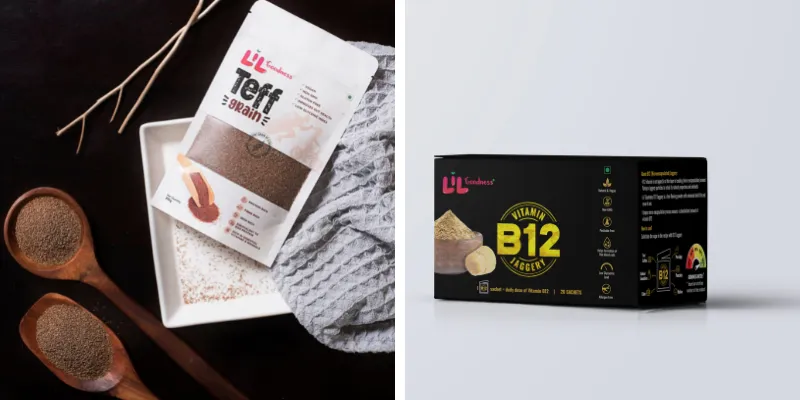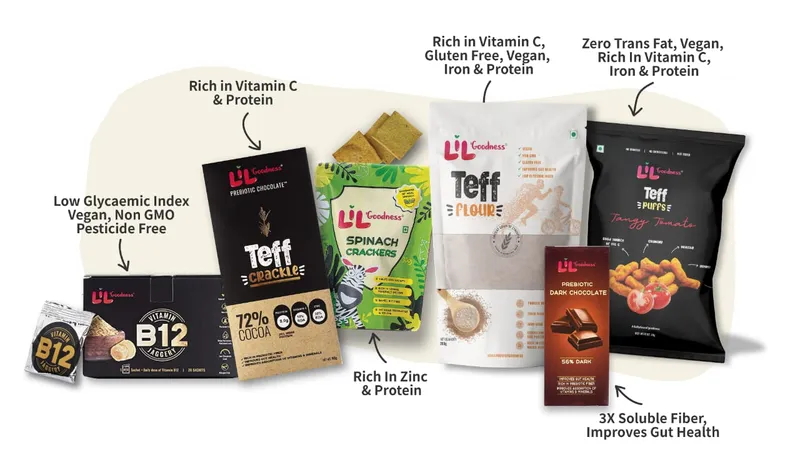This nutrition and snacks brand has added vit B12 jaggery to its daily dose of Lil’ Goodness
Lil’ Goodness is a Bengaluru-based healthy snacks startup founded by Harshvardhan and Pariksha Rao in 2018. This year, it has added B12 jaggery to its range, which aims to address the vitamin B12 deficiency among the Indian population.
Gone are the days when the term “healthy snacking” was considered an oxymoron.
With “immunity building” and “healthy eating” becoming the new buzzwords amidst the COVID-19 pandemic, a large number of consumers are turning towards nutritious snacks and eatables. India is seeing traditional grains like ragi, millets, oats, and others make their way into healthy snacks.
According to the Polaris Market Research Report, the healthy snacks market would reach around $40,699 million by 2026. Research firm Euromonitor pegs India’s savoury snacks business at Rs 33,500 crore.
With “a healthy dose of goodness” as its peg, Lil’ Goodness, founded by Harshavardhan, an IIM Calcutta alumnus and Pariksha Rao, a nutritionist in 2018, finds itself at the top of the “healthy snacks” market.
The packaged food brand, designed to build immunity in children, offers cereals, puffed snacks, prebiotic chocolates, crackers, porridges, and yoghurts. Its latest product launch is the Lil’ Goodness B12 jaggery sachets, which aim to address the problem of vitamin B12 deficiency among the Indian population.
“Seventy-four percent of Indians have insufficient vitamin B12, which is alarming. B12 is very important for the production of haemoglobin, and the precious vitamin has a correlation with diabetes and iron deficiency. Finding a good source of B12 in the Indian diet is very difficult as most of the sources are from animals. Hence, most of India depends on tablets, etc. for the same,” Pariksha tells HerStory.
The brand has sought a simple way to address this issue – replacing table sugar with a natural and vegan source like B12 jaggery. In this, vitamin B12 is entrapped in a thin layer around the palmyra jaggery particles to retain its natural properties and nutrients.
A healthy dose of Vit B12

As a clinical nutritionist, Pariksha says she believes one cannot entirely depend on supplementation.
“In my experience, I have seen that no matter what, I cannot meet a patient’s or consumer’s requirement only through diet. What is available is a therapeutic dose for B12, which may cause problems if the person has a weak tummy. For a person with a clinical deficiency of vitamin B12, after the mega dose to bring it down, they can go in for this source – the B12 jaggery,” she says.
She explains that palmyra jaggery is low in glycemic index, high in antioxidants, and very high in flavonoids. The micro-encapsulated B12 is added in the exact amount that a body needs on a particular day.
According to Harsha, the aim of Lil’ Goodness to look at major nutritional deficiencies present in the Indian population and try and use natural foods to bridge this gap via healthy snacks.
“We will be focusing on protein, vitamin B12, vitamin C, iron, and zinc, because these are very difficult to meet on a daily basis, especially when it comes to Indian children and adults,” Pariksha says.
She dispels the notion that a parent packing a bowl of colourful brinjal rice might think they are giving a child a complete nutritious meal, but that’s not the case.
“It’s only carbs. We need to address deficiencies individually. For example, we are incorporating Vitamin C in our chocolates; also, our Teff puffs are a good source of Vitamin C. For iron, we are working on a snack bar and so on,” she adds.
Lil’ Goodness also offers protein boxes in line with a child’s requirements.
“If my kid is predisposed to a certain type of deficiency, how do I make up for that? So, we came up with a wonderful concept where we take basic information from a parent - the child’s eating habits (how many fruits, veggies in a day), what they enjoy, age, BMI, etc. Based on these inputs, a protein box or immunity box is recommended,” Pariksha says.
Building a community and increasing engagement

The Lil' Goodness product range
The founders believe the right way to introduce and sustain healthy snacking lies in building communities. They run a A-Z series, picking up one ingredient at a time or talking about one deficiency at a time on their social media handles. The material with the subscription box includes a chart that explains the ingredients in a manner easily understood by children.
Lil’ Goodness interacts with parents on Instagram and sees a high rate of engagement, as much as 7,000 impressions on a single post, which Harsha believes is “pretty high for this type of brand”.
The focus is on building a community organically and reaching out to select influencers. In the past, the brand has collaborated with stars like Shilpa Shetty and Raveena Tandon, who have talked about Lil’ Goodness on their Instagram stories. They also have mums talking about good nutrition, good snacking, and more.
In September 2019, Lil’ Goodness acquired sCoolmeal – a meal subscription service that provides healthy and nutritious vegetarian lunches to children by partnering with schools.
Last year, Lil'Goodness and sCoolMeal, also partnered with Swiggy's Hope, not Hunger campaign to provide nutritious, hygienic meals to underprivileged children in Bengaluru during the pandemic.
Growth and the future
Available across 200 stores in India and on all major ecommerce platforms, its products like puffed snacks and prebiotic chocolates have been best-sellers.
“We grew by 25x from March 2020 to March 2021. All this happened in the middle of the pandemic,” Harsha says.
The duo is also confident about their products made with Teff, a super grain with origins in Ethiopia and grown in the North Karnataka region.
“We have an emotional attachment to the grain because it has helped the farmers of that area. Teff is a complete balance of protein, carbs, fat, vitamins, minerals, iron, flavonoids. I have never seen a grain provide flavonoids or vitamin C,” Pariksha says.
The biggest challenge while developing healthy snacks is to not compromise on taste while adding nutrition and goodness, say the founders. The consumer perception that healthy equals expensive also needs to be changed.
“By taking on the challenges, we have managed to create both a buzz and a foothold in the market. We want to continue to introduce a daily dose of goodness, through different products that offer good nutrition," Pariksha adds.
Edited by Teja Lele




![[Techie Tuesday] Meet Rama NS, one of the first women engineers from Karnataka who put Electronic City on the global map](https://images.yourstory.com/cs/2/8e7cc4102d6c11e9aa979329348d4c3e/Untitleddesign-2021-04-19T125609-1618817343011.png?fm=png&auto=format&h=100&w=100&crop=entropy&fit=crop)





